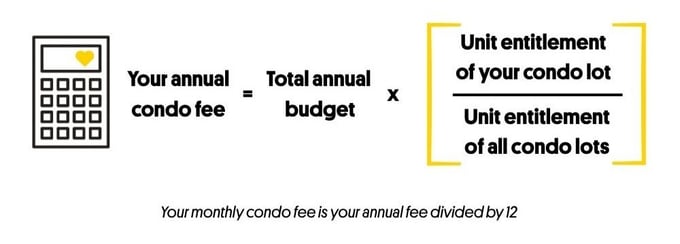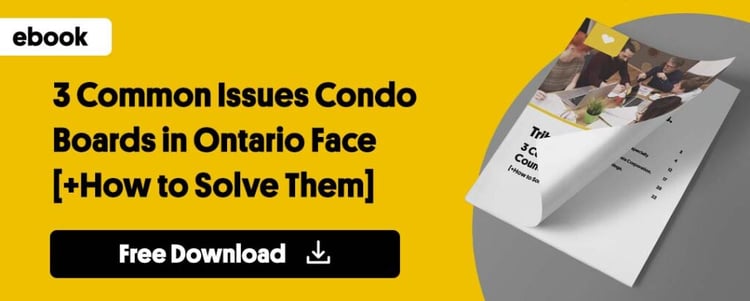
Condo Fees: What You Should Know
Condo fees are a crucial part that comes with community living. But for Owners, opening the annual Budget Package shouldn’t come with confusion or uncertainty.
Here at Tribe Management, our Mission is to connect communities across Toronto and Ontario. We want to provide Condo Boards with the information to help keep communities happy and healthy.
This blog article will help you learn more about how financials in a condo community work and provide you with best practices when it comes to financial planning.
Table of Contents
-
What are condo fees?
-
How is my monthly condo maintenance fee calculated?
-
What if my condo fee increases?
-
What do condo fees cover?
-
How to read a condo fee schedule?
-
How to learn more about the financial health of a community?
-
Budgeting and condo fees best practices
-
Conclusion
-
Bonus: Special Assessments
What are condo fees?
To start off simple, condo fees (or condominium contributions – which can be used interchangeably) are monthly contributions by Owners to contribute towards the maintenance and upkeep of your community. The budget (containing your condo fee) is approved and sent out by your community’s Board of Directors.
As you move through this article, we’ll continue to build on this definition to learn more about how it all works.
back to the table of contents
How is my condo maintenance fee calculated?
Your individual condo maintenance fee is the product of the total contribution of your community (which is made up of two portions: 1) Operating Fund & 2) Reserve Fund), multiplied by the unit entitlement of your condo lot, then divided by the total unit entitlement of all the condo lots in your community. This amount indicates the payment you are required to contribute each month for the next twelve months.
Note: The Reserve Fund for a community is required by law, and once studied and completed by an Engineer, the Board of Directors must choose the path they want to take for the next 3 years.
Once determined, it gets built into the total contribution on an annual basis.
Psst...wondering what unit entitlement are? Keep reading below.
To help you learn how your individual strata fee is calculated, here’s a simple equation for you to use:
Unit Entitlement
Unit entitlements are set by a developer when a condominium is built. In a conventional condominium, they are typically based on the size of the units.
The larger the unit, the more unit entitlement an owner has, the smaller the unit, the less an owner has. The purpose of unit entitlement is to determine a condo owner’s share of condominium contributions (fees) and voting rights. Typically, the unit entitlement is proportional to the size of the owner’s condominium unit.
Think of a pie. Blueberry...strawberry...or whichever flavour you prefer. This pie represents the entire condo. But when the pie is split into slices, or in this case, condo lots for each Owner, each slice can be a different size. The larger the slice, the greater the unit entitlement. These slices help represent how much each Owner owns the pie as a whole.
The unit entitlement stays the same throughout the life of a condo with very few exceptions.
How much is a typical condo fee?
Condo fees vary greatly from building to building. In Ontario, condo fees cover Condo common area utilities and sometimes water entirely. They also cover maintaining the common elements.
Note: Common elements generally include hallways, lobbies, elevators, amenities and grounds around the property including parking areas and private roadways within the property.
A portion of the condo fees cover the property’s Reserve Fund which includes non-routine major repairs and replacements. This could include roof replacement, building exterior repairs, boiler replacement, etc.
Condo fee costs vary depending on age of the property, size of the buildings and the types of amenities included in the condo.
back to the table of contents
What if my condo fee increases?
As with most operations, it is common (and most likely guaranteed) that your condo maintenance fee will increase year over year.
As shared above, your community’s budget must be completed, approved and sent out.
New condo fees come into effect on the first day of the new fiscal year.
How much can condo fees increase in Ontario?
Condo Fees are based on your Condo Corporation's projected expenses as outlined in the annual budget. Expenses for a community can increase due to several factors such as inflation, unexpected repairs, or required building upgrades. As such, there is no limit on how much a condo fee may increase in Ontario.
Are Condo Fees tax deductible?
If the condo unit is your main or live-in resident, the answer is no. However, if you rent out your condo, you may be able to to claim your condo fees on your taxes in Ontario. We recommend you contact a qualified tax accountant for further guidance.
back to the table of contents
What do condo fees cover?
In Ontario, there are two funds that every Condo Board must maintain.
The operating fund.
This is what is used to pay for common expenses that maintain the building or occur more often than once a year (building insurance, Property Manager’s fees, gardening, garbage collection).
The contingency reserve fund.
This is used to pay for expenses of a capital nature that occur less than once a year, or for more unusual expenses approved by the Owners at a general meeting (lobby upgrade, new roof, new gutters, sidewalk fixes).
Interested in learning more about condo fees? Check out our blog post “What Do Condo Fees Cover?”
Where do my condo fees go?
![]()
Do Condo Fees include property tax?
Your monthly condo fees do not include your property taxes. These are determined by your municipality and you are responsible for paying them directly.
Are utilities included in Condo Fees?
The utilities for common areas (like a lobby or parkade) will always be included in your condo fee however the same cannot be said for the utilities that solely serve your unit. What unit utilities are included in the monthly condo fee varies from property to property. To determine which is the case for your community, refer to your budget or contact your Community Manager.
Read more about these funds in our next section and learn about where it comes up on financial statements.
back to the table of contents
How to read a budget and other financial statements for your community.
Every year, you will receive a Budget Package (either electronically or in the mail) prepared by your Board of Directors and Community Manager. This is the document that you can reference to better understand what the budget and condo maintenance fees that have been approved by your Board of Directors for the next year are.
At Tribe, we help Condo Boards prepare a clear, and easy-to-read Budget Package.
Here are some items that are included in a Budget Package:
- A list of all the condo lots, unit numbers, and unit entitlement amounts. This makes searching for the information relevant to your unit easy to find and promotes transparency in the community. This section also indicates the total unit entitlement in a community which is a part in determining individual condo fees.• A stated amount of the monthly fees due (calculated with the equation in the previous section). This is the key number you will need to look for in your Budget Package. This number indicates the monthly amount you will need to pay for the next year which will remain constant until the Board of Directors approves and send out a new Budget Package.
- A breakdown of the proportion of your condo maintenance fees allocated to the Operating Fund and the Reserve Fund. In addition to the information regarding the total monthly condo fee amount required, you will also be able to see how much of that total contribution amount will go towards each fund. To learn about what these two funds cover, see the last section on: Where does my condo fee go?
Note: Although the condo maintenance fee helps contribute towards two different funds, for condo communities without sections, only one transaction will be required for the amount of your total monthly condo fee via cheque or pre-authorized debit. The amount will be split up by your Condo Board, who will allocate it to the appropriate funds.
- A comparison of the condo fee proposed for this year vs. last year. As mentioned earlier, it is likely that your condo fee will increase year over year. This section in your Budget Package reminds you of the monthly condo fee you paid in the prior year, and how much that amount has changed with your new monthly fee.
Note: As an Owner, solely looking at the change in this number is not a good option! You must consider other financial documents provided by your Condo Board to fully understand why you are paying the condo maintenance fee you have been assessed for this year. Keep reading to find out what you should look for to learn about the financial health of your community
back to the table of contents
How to learn more about the financial health of a community?
You’ve come to the right place. Now that you know about unit entitlement and how to calculate your monthly condo maintenance fee based on the numbers provided in your Budget Package...let’s look at where these numbers come from using the balance sheet, budget and budget comparison.
Note: Note: In addition to your Budget Package, you will receive an audited set of financial statements in your AGM packages which includes the statements below.
At the core of understanding the financial health of your community, the balance sheet is a key indicator of how your community is handling its finances. You can think of this statement as a snapshot of your community’s financial position at the time that the statement is prepared.
In this section, we will cover the basics of what the balance sheet shows you:
Assets
Assets refers to everything your community owns.
For a condo community, this can include cash stored in the bank for the Operating Fund, Reserve Fund and Special Assessments (see our bonus section on Special Assessments below to learn more), term deposits and accounts receivable.
An important thing to note is that if there is a balance in the accounts receivable amount on your balance sheet, then there are outstanding charges that has yet to be collected. This can include outstanding condo maintenance fees, Special Assessments, bylaw fines or invoice chargebacks.
Remember: The numbers provided in the balance sheet capture the financial position of your community on the date which it was prepared (indicated on the top of your statement). This means that any transactions that occur after this date will not be reflected.
If you’re working with a Property Management company, they can help your Condo Board keep track of its financials by providing you with accurate and timely statements. Here at Tribe, we have established systems and procedures to ensure Condo Boards understand the financial position of their Condo Corporation and maintain control of both the cash flow and financial assets. Our Community Managers are experts!
Liabilities
Liabilities refers to everything your community owes.
This includes accrued liabilities (which indicates an expense has been incurred, but where an invoice has yet to be received), amounts that need to be transferred to the Reserve Fund or Special Assessment account and any accounts payable (or any invoices issued to the community but has yet to be paid).
If you’re working with a Property Management company, your Community Manager can help to ensure that your condo’s budget is properly done so that there are enough funds to pay for recurring maintenance expenses.
Note: At Tribe, we also help advise Boards to take time determining their Reserve Funds in order to help plan for future capital expenditures.
Equity
Equity refers to the remaining value after you subtract your liabilities (what you owe) from your assets (what you own).
In this last section of your balance sheet, you will learn whether your community has an operating surplus or deficit for the year.
If you have a surplus, a small part of the surplus can be retained to cover unexpected expenditures in the budget.
However, the reminder should be used to reduce condo fees in the next annual budget, or it can be used to top up the Reserve Fund if it is insufficient.
Important note: If funds are transferred to the Reserve Fund, it cannot be used for any expenses other than those approved in the Reserve Fund Study.
Next up, we have the operating budget – a document that breaks down all the planned revenues and expenses for the upcoming year.
This document is especially important because it indicates how much it costs to maintain the community and how much the condo fee should be in order to contribute to these expenses.
To understand this, let’s walk through the two components within this statement.
Revenue
Revenues refer to the income that your community receives.
Almost all the revenue that a condo receives comes from condo fees, with a small portion stemming from other condo-related operations such as amenity room and guest suite rentals (if your community allows for it), locker rentals, parking stall rentals, or interest income to name a few.
It is important to remember that Condo Corporations are non-profit organizations, meaning that condos are not allowed to make a profit from operating.
Expenses
Expenses refers to the costs that your community incurs.
Under this section, you will find all the ways the revenue in your community is being used to help make your building a happier and healthier place. Some of the main categories of expenses you may find in your operating budget are:
- Administration. This includes items such as audit/legal, bank charges, insurance, insurance appraisals, management fees, photocopy/postage/courier fees, wages for concierge and security, management fees and miscellaneous expenses.
- Building.This includes items such as dryer vent cleaning, fire equipment maintenance, gutter cleaning, parking lot upkeep, painting and decorating, pest control, elevator, roof and general repairs/maintenance.
Note: This does not include any special projects which are projects that are not accounted for throughout the year (such as an unexpected roof repair of pipe replacement) that requires a Special Assessment. Learn more about Special Assessments in our Bonus Section at the end of this article.
- Utilities. This includes items such as electricity, garbage disposal, compactor expenses and telephone/cellular costs.
- Grounds Maintenance. This includes items such as landscaping, road repairs, snow removal, tree maintenance and anything that takes place on strata grounds, but is not associated with the building structure.
All of these expenses are then summed to determine the total expenses for your community.
back to the table of contents
Budgeting and condo fees best practices
Here comes the fun part – some quick tips for you to learn more about the best practices for your condo community when it comes to budgeting and condominium contributions.
Some of these are explained throughout the article, while others are new tips. Either way, they’re must-knows for you and your community.
Don't compare.
Never just look at the Condo Maintenance Fees Schedule in your Budget Package to solely compare the amount you paid last year vs. the amount proposed for you to pay this year.
An assessment of what needs to be done in the community will always help you understand why you are paying what you are. This means looking at the balance sheet, operating budget and budget comparison in your AGM Package.
Do not underbudget!
In the case that your community does not allocate the appropriate amounts to the budget, your actual costs may exceed ones budgeted. This means that your community will incur a deficit where it is underfunded. The best thing to do here is for your Board of Directors to establish the appropriate expected condo fees required for the coming year and not to downplay your expenses.
back to the table of contents
Conclusion.
Now that we’ve covered how unit entitlement works, how condo maintenance fees are calculated and why assessed fees can be further analyzed through the audited financial statements in your AGM Package, we hope you’re feeling a bit more confident when the time comes to open up your Budget Package to find out what their condo fees are for the coming year.
At Tribe, we're on a mission to build happier and healthier communities through connection and education and help Strata Councils/Condo Boards and owners understand the important aspects of Property Management.
[Bonus: Special Assessments]
Now that we've covered condo fees let’s take on one more topic: Special Assessments.
Special Assessments are additional funds collected from Condos (on top of condo maintenance ugh funds in the Reserve Fund or if a Board decision is conducted to decide against using current Reserve Funds.
But...how are these different from condo maintenance fees? These expenses are ones that have not been included in the budget and can include expenses such as an unplanned roof repair.
Commons Questions about Special Assessments:
- What is the process for creating a Special Assessment? Condo Boards will determine the required amount and once passed, they must provide notice to the Owners.
- What do Boards determine about Special Assessments? The purpose of the Special Assessment, the total amount, the due date and the proportionate share.
- What can you levy for? Urgent and unexpected maintenance, shortfalls in the Operating Fund, increases in the Reserve Fund and capital improvement in order to satisfy judgment.
Note that any Special Assessment amounts collected cannot be paid back and must be paid into the Reserve Fund if there is excess. Hence, a good practice is to track the Special Assessment under a separate financial general ledger account!





.jpg?width=352&name=Blog%20Featured%20Image%20(7).jpg)
